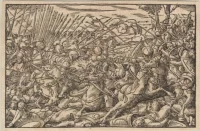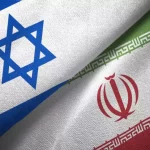Every era has its own characteristics. As the Body of Christ the Saviour, the Church is in a continuous process of actualising the Gospel and of creatively understanding what, exactly, the Saviour brings to the modern-day world, while at the same time preserving its integrity and faithfulness to the Head. Every era has had its own previously unknown challenges, and history shows how the Church has handled them. There was the confrontation between the first Christian community and the powerful tradition of the Old Testament legalism; Christianity’s encounter with the diverse world of paganism, its philosophy and culture; and the conflict with the well-oiled and ruthless machine that was the Roman state. Given their modest numbers, how is it that the first Christians dared to confront these colossal forces, which, to this day, largely determine the specific nature of European culture and civilization? We know that Christianity ultimately proved more powerful and that it triumphed, becoming the new leaven and transforming all of the seemingly inviolable and self-sufficient principles of social life, state structure, philosophical heritage, and ancient culture. From the day of its foundation, the Church has had all the means necessary to save the world, and Christians are called upon to tell the world about them, even when we are being goaded into silence and inaction as we are today. The Church bears witness to eternal life and, by preserving the word of God, lives in anticipation of things to come. The head of the Church is our Lord Jesus Christ, the God-man – our principle guide as to what human beings can and must become.
For a long time now, we have been facing tough civilizational changes in a modern world where traditional universal values are increasingly being rejected. There is a growing divide between Christian evangelism and the ideological paradigm in which modern humanity is developing. Notions of the Creator, the world and the individual, of moral principles, of human relationships, and of religion’s role in society and in personal lives are all being revised. None of these trends are entirely new. In the early 20th century, philosopher Vasily Rozanov noted that: “Existence without higher ideas is defeating, and perhaps will defeat, Christianity, as Christianity once defeated classicism” (Italian Impressions. Paestum). In other words, the fight for people’s souls may not necessarily involve open attacks by evil forces, but rather the gradual erosion of values, including sacrificial love, in favour of consumer comforts, small and petty goals, and spiritual and emotional enervation. It is clear today that the insights of this remarkable Russian thinker are coming true at an alarming rate. We have witnessed the rapid development of technologies, political and economic changes, and shifts in social paradigms, and these rarely benefit humanity. I will focus on a few of the most significant challenges facing the Church of Christ in today’s world.
How civilization can remain strong in the face of chaos
The first challenge is the desire to limit the Church’s influence over individuals and society. Since the dawn of Christianity, humanity’s arch-enemy has been rising up against the Church of Christ in various ways, from the open persecution and oppression of Christians to attempts to declare Christianity outdated and irrelevant. Today’s secular society is not averse to assigning the Church the role of “ethnographic museum”, where believers are nothing more than the keepers of traditions that have little to do with the real lives of their contemporaries. As “the pillar and bulwark of the truth” (1 Timothy 3:15), however, the Church is not just a keeper of lofty, time-honoured ideas. The Church is a space of spiritual renewal both for individuals and for society. The gospel of Christ is the life-giving word. It is glad tidings for the future of every individual and of humanity as a whole. Within the Church, people can become truly free. Not the irresponsible freedom of “I’ll do whatever I want”, but the freedom of a friend of God; the freedom that lies at the core of genuine love and genuine creativity. Freedom in the fact that the word of Christ is still refracted and implemented in real life to this day, although “this saying is hard” (John 6:60), so is difficult to accept for someone accustomed to egoism. On the contrary, the concepts and systems that support and promote human selfishness, that indulge people’s desires, whims and lust, are appealing because they exploit people’s yearning for pleasure and comfort. More often than not, it is at this everyday, utilitarian level that Christianity faces opposition. Today, the Church bears special witness to the fact that preserving the religious and, above all, Christian world-view is a guarantee against anomie and safeguards the viability of modern civilization by overcoming selfish over-indulgence and violence.
The crisis of the family institution has become an important manifestation of this confrontation. In modern civilization, the notion of family has eroded beyond all recognition. The seeds of misconceptions regarding the importance of so-called gender self-identification, the need for early sexual development, the various forms of marriage, the naturalness and normality of so-called trial marriages, and the childfree movement have been sown in the public consciousness and are actively growing. These and many other “viruses” are destroying traditional family values. Yet not only do the two words “family values” indicate one of the ways to achieve eternal life, they are also a guarantee of happiness for individuals, parents and children here on Earth, as well as a solid foundation for a sustainable social life. By rejecting the fundamental Christian truths about humanity, civilization is becoming helpless in the face of the chaos destroying human societies and lives.
To confer a higher meaning on the European enlightenment and lead to its ultimate development
The second challenge is growing attempts to interpret scientific data in an ideological, rather than purely scientific, way. This usually involves such disciplines as psychology, sociology, neurophysiology, and many others. The scientific atheism of Soviet times is now a thing of the past, but ideologists of modern “scientism” (i.e. belief in the omnipotence of science and the absolute priority given to its role in culture) assume that every human problem in the modern world can be solved by science. Such an approach goes far beyond the possible impact of science on human life and artificially contrasts science with religion. Priests, psychologists and psychiatrists should all do what they do best and should help individuals collectively. The success of their mutual efforts depends, among other things, on the dissemination of the Orthodox Church’s spiritual experience with which not everyone is familiar. The outstanding philosopher Ivan Kireyevsky wrote: “I wish only one thing: that the principles of life preserved in the teachings of the Holy Orthodox Church may fully permeate the beliefs of all our ranks and classes so that, by prevailing over the European enlightenment and embracing it with their plenitude rather than replacing it, these lofty principles should confer on it a higher meaning and lead to its ultimate development” (On the nature of the enlightenment of Europe and its relation to the enlightenment of Russia). I believe that this task is still on today’s agenda, and solving it will enable us to both enrich science and improve people’s lives.
One way in which the scientism issue manifests itself is the risk of dehumanising humanity as a result of the dissemination of transhumanist ideas, that is, “going beyond human limits” and preaching some kind of qualitative improvement in the physical nature of humanity through science and technology. Transhumanists often refer to their desire to ease people’s suffering and make their physical existence more perfect. There is nothing wrong with these goals. We know many remarkable scientific discoveries that have been of real benefit to humanity. Thanks to medical discoveries, for example, certain epidemics that were a global disaster in the Middle Ages are now a thing of the past. The problem with transhumanism is that it reduces people to their biological or, in patristic terms, corporeal component, and adherents to this school of thought believe that, in order to perfect this component, it is acceptable to compromise moral standards and go beyond what is morally permissible. Transhumanism promises humanity “digital immortality” and the overcoming of physical limitations, almost as if creating a new person. Through films and literature, people these days are constantly being fed the idea that humanity is in need of “alteration”, “renewal”, or, to use a computer term, an “upgrade”. This is a new form of anti-Christianity that declares a genuine concern for people while actually destroying the very truth and nature of humanity and of people in the image of God.
Even today, the Church provokes a shout of amazement
The question regarding the Church’s future goals and its reaction to the challenges of our time is an extremely simple one. The Church will continue to do what it has always done, and that is to preach the gospel of the Kingdom of God that came down to Earth. To this day, the Church has preserved intact the basic truths about people, the peculiarities of their inner lives, their spiritual and emotional problems, and their ability to overcome them. We did not invent these truths, they were revealed to us by God, the Creator of humankind, who shared with us His divine plan regarding what a person should be. And, with full authority, the Church says today what it said one thousand years ago: “Yes, we know what a person should be.” It is not an area for guessing or hypothesising, but for sound expert knowledge. I will name several characteristics that have differentiated the life of the Church since the Apostolic Age and which it uses to show both individuals and society as a whole the path of development.
The first characteristic is the way that Christians treat each other. In his work Apologeticus, Tertullian, a Christian writer of the 2nd century, refers to what pagans say about the Christians of his time: “‘Look,’ they say, ‘how they [Christians] love one another’ […] ‘and how they are ready to die for each other’” (Apologeticus, ch. 39, sect. 7). The pagans’ amazement demonstrates one of the fundamental pillars of the Christian mission. It is the Christian love that, to this day, can and does manifest itself in genuine social solidarity, in the pursuit of social justice, in a genuine concern for those who are close, and in the patient bearing of one another’s burdens.
The second characteristic inherent in the Church is its attitude to everything outside of it. Christians can be loyal to the state, to a social order with all its customs, and even to the culture rooted in paganism, but with one important caveat: that this loyalty does not interfere with their faith in Christ’s truth. According to St. Justin Martyr the Philosopher, the entire human race participates in the divine Logos. Therefore, the best of what was in harmony with the Logos needed to be interpreted and reconsidered, rather than rejected and denied. “Whatever things were rightly said among all men, are the property of us Christians”, wrote St. Justin the Martyr in his Apology (The Second Apology of Justin). With their wide and generous view of the world, early Christian thinkers helped incorporate the best of ancient heritage into the harmonious construction of an emerging new culture.
The third most important characteristic of the Church is its orientation towards the eschatological perspective that underlies the Christian understanding of history. While performing the sacrament of communion (the Eucharist) in remembrance of the Saviour, Christians also felt that the coming of the Lord Jesus was at hand. It was a joyful anticipation of the triumph of the Kingdom of God rather than a fearful expectation of doomsday. The fulfilment of the sacrament of thanksgiving, harmoniously combined with matters of love, was the beginning of a new Kingdom; a Kingdom not of this world, but rather a Kingdom in which God rules, and love and truth triumph. The whole Bible not only looks back to ancient times, but also to the future; to a time when, according to Paul the Apostle, “God will be all in all” (1 Corinthians 15:28). The whole of early Christianity is deeply imbued with the joy of transcending mortal reality: the Resurrection of Christ has already taken place and it will reach everyone.
So, the three most important characteristics of the Church through which we are shown how to transform both our personal and our social lives are: internal unity in brotherly love; kindness to those around us and to the outside world with no concessions to the truth of the Gospel; and, finally, an uplifting sense of history, including the closeness of the eternal Kingdom of Christ and the universal resurrection.
An “upgrade” of humanity is possible
The Church says that the goal of human life is to attain communion with God and liberation from slavery to sin. This is the Church’s response to the temptations of scientism and transhumanism mentioned earlier. Technological development is not harmful in and of itself, but it can be a false goal if people lose their understanding of the spiritual dimension of their lives. An “upgrade” of humanity is possible, but not through biotechnological transformations. It is possible by purifying our hearts from passion and acquiring virtues, first and foremost the virtue of love that likens us to God. The philosophy of transhumanism offers humanity digital immortality, but God has granted us genuine immortality. Today, even within the secular scientific community, the question of whether the product of the kind of scientific and technological progress advocated by transhumanism can be referred to as a person is being asked increasingly frequently.
What, actually, makes a person a person? What are the objective criteria of “humanity” that anyone daring to “improve” human nature must bear in mind? We Christians have the answer: the measure of humanity is Christ, who not only fulfilled God’s original purpose for humanity, but also, through his death and resurrection, destroyed all fear of suffering and death – the main obstacles that prevent us from living our lives to the fullest. According to Paul the Apostle, “no other foundation can any one lay than that which is laid, which is Jesus Christ” (1 Corinthians 3:11). Today, God in Christ has a simple message for the whole of humankind: a person’s life primarily depends on their ability to love, rather than on the existence or otherwise of high-tech gadgets. Even if one concedes that technological developments will significantly increase life expectancy, what kind of mechanism or programme will be able to master the art of self-sacrifice, mercy, respect for others, kindheartedness, loyalty, gratitude and compassion? Even if surrounded by the very latest scientific achievements, life is doomed to failure without the development of these essential qualities.
While fulfilling its two-thousand-year-old task of preaching the Truth about God and humankind, the Church has to find appropriate forms and words in order to convey the Gospel message to contemporaries in plain and accessible language. It is not about primitivization or about simplifying Orthodox teaching for the sake of “clip thinking” and superficial omniscience, of course. But everything that is being said to the outside world on behalf of the Church must be vital and relevant. Our message must not be made up of words that are beautiful but irrelevant. Our message must show to the world those characteristics of Christianity and of Christian society that were mentioned earlier. Both priests and laypeople should seek to convey this message. A missionary is not a specific profession, but the normal state of being for any Christian. A missionary is someone who brings the Gospel to those who do not know Christ. Each member of the Church is called upon to use their life as a sincere testament to the fact that being with Christ in the Church is the quickest and surest way to live a full life and achieve personal happiness.
I have a few extra words for the youth of today. All of the temptations listed above – contempt for the eternal message of the Gospel, neglect of the family, arrogant confidence in the superiority of scientific knowledge over the development of the inner self, and dehumanisation under the pretext of caring for people – are primarily aimed, and will continue to be aimed, at you young people. But you’re the ones who have the necessary energy and concern to resist these temptations, including by following the path offered by the Church, through friendship in the highest sense of the word, through openness and a creative understanding of the world around you but without compromising the word of God, and through striving for the future with the understanding that the crown of it all and the crown of history is the meeting with Christ. You – God willing – still have decades in front of you and are already being called upon to change the world and to change society, including by changing yourselves.
It will take a lot of effort to preserve the unity of Orthodoxy
As a theanthropic entity, the Church exists both within society and outside of it. We need to think very seriously about how to bridge the artificial gap between the life of society and the traditions of the ancient church, which was never afraid to include the very best available, such as the conceptual framework of philosophy, and the finds and discoveries of classical Greek and Roman culture. Such integration is a very delicate process that requires not only time, but also great care and wisdom. As such, it is extremely important to develop an active dialogue between the Church and the world of culture, as well as to significantly increase the Church’s interaction with members of the academic community. The Church is open to communicating with anyone who genuinely wishes to enter into a dialogue.

Much work lies ahead in the coming years. As part of our domestic mission, we must move towards developing the level of cooperation between the Church and society so that there is more room in the world for love, compassion and mercy. In a pan-Orthodox context, it will take a lot of effort to preserve the unity of Orthodoxy.
In fraternal Ukraine, we are currently facing the most challenging stage in our Church’s centuries-long history. The constant exacerbation of the political situation since 2014, the increased pressure on the canonical Ukrainian Orthodox Church from the authorities, the Ukrainian schism and radical political forces, Constantinople’s unlawful encroachment on the territory of the Ukrainian Orthodox Church, resulting in the church being granted a so-called autocephaly created by the schismatics of pseudo-church structures, and the state’s adoption of discriminatory laws at the end of 2018 and beginning of 2019 have all led to the violation of Orthodox believers’ rights, the seizure of church buildings, and an incitement of inter-religious hatred. Despite all this, the Ukrainian Orthodox Church is an impressive example of firmness in faith and of internal unity. I believe that, with God’s invincible help, it will stand strong in truth and light against all these trials, and the forces of darkness rising up against it will be driven away “as smoke is driven away” (Psalm 68:2).
The result will largely depend on how unanimous and consistent the support of Orthodox believers will be for their suffering brothers and sisters in Ukraine, and how convincing and firm we will be in preserving the church’s structure, which is based on the centuries-old tradition of the Church.
May God grant the Orthodox Church continued success in testifying to the whole world that Jesus Christ is the True God and Saviour, and that His Church is a vessel of sanctity and love on which anyone can head towards the future filled with hope!
This article was originally published on Expert-Online journal.
Adapted and translated by ORIENTAL REVIEW.














Ortodoxy in the christianity was lost with the correctores manipulating the gospels with the dogmas imposed by the councils, the destruction of the Templars, the changes made by Giovanni XXIII and Giovanni Paolo II.
OK, granted, “Expert Online Journal” is a fundamentalist, evangelical, religious site, and has every right to free expression. But why does OR feel the need to republish such tripe? As I’ve come to the conclusion that OR is actually run by and for the “church,” and as I already have sufficient sane, serious, critical reporting sites to digest, I’ll say “see ya!”
The article is overly long, I would venture to say that the article minus nonsense = zero.
Humans are rational animals. Human nature cannot be upgraded without evolution, or artificial selection for desirable traits. Our knowledge can be enhanced but genetics has put an upper limit on what is possible. The article opposes attempts at improving human nature (calling it “transhumanism”) but believes that Orthodox culture can do the job while natural means cannot. Human nature should be defined biologically, which is why lower animals cannot be upgraded to human through Orthodox (or any other) culture.
The humanities consists of more than science. Which the author would realize, if he had knowledge of civilization. Instead he appears intent on undoing renaissance fusionism.